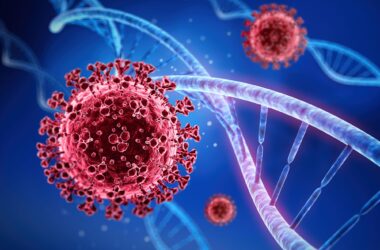
Cette nouvelle méthode de classification des tumeurs permet aux scientifiques de prédire la récidive avec plus de précision que la méthode actuelle. Crédit : Université Northwestern
La croissance d’une tumeur cérébrale récurrente est stoppée par un nouveau médicament.
Les options d’un patient sont limitées lorsqu’une tumeur cérébrale non métastatique – un méningiome – récidive après une opération et une radiothérapie. Ces tumeurs agressives, qui surviennent dans jusqu’à 20 % des cas et peuvent entraîner une invalidité ou même la mort du patient, n’ont aucun médicament approuvé.
Cependant, les scientifiques de la Northwestern Medicine ont identifié un médicament qui inhibe la croissance des méningiomes les plus agressifs, ainsi que la manière d’identifier le plus précisément possible les méningiomes qui répondront au médicament, grâce à une collaboration internationale avec des scientifiques de l’Université de Californie, San Francisco, et de l’Université de Hong Kong.
Le médicament est un traitement anticancéreux plus récent appelé abemaciclib.
Les scientifiques ont démontré l’efficacité du médicament chez des patients sélectionnés, des modèles de souris, une tumeur cérébrale de tissu vivant en 3D (organoïdes) et des cultures cellulaires.
Selon les chercheurs, les méningiomes peuvent être divisés en sous-groupes moléculaires présentant des résultats cliniques et des taux de récidive différents. Cette nouvelle approche de classification des tumeurs permet aux scientifiques de prédire la récidive avec une plus grande accuracy than previously.
Currently, doctors analyze a tumor specimen under a microscope after surgery and grade it one, two, or three in terms of its aggressiveness. However, because the grade is only approximately 70% correct, some cancers will act differently than they appear under the microscope.
“Our study identifies which patients we should treat with this drug, because their tumor will likely respond to it,” said study leader and corresponding author, Dr. Stephen Magill, an assistant professor of neurological surgery at Northwestern University Feinberg School of Medicine and a Northwestern Medicine physician. “We now have the potential to give them options and hope for a longer, symptom-free life.”
Magill also is a member of the Robert H. Lurie Comprehensive Cancer Center of Northwestern University.
The paper was published on May 9th, 2022, in the journal Nature Genetics.
Meningiomas are the most common primary (non-metastatic) tumor in the central nervous system, with about 31,000 people diagnosed with a meningioma every year in the U.S. The symptoms are headaches, seizures or neurological deficits (weakness, vision loss, double vision or sensory changes). The drug is a cell cycle inhibitor, meaning it blocks the cell division cycle and inhibits tumor growth.
“Eventually we hope to tailor medical therapy to the genetic changes within each individual person’s meningioma,” Magill said. Investigators studied molecular changes in the tumor to understand what drives its growth and design therapies that target the Achilles’ heel of the tumor.
“We can find a weakness in that tumor, put a stick in the spokes and stop it from growing,” Magill said. The new study was conducted by doing DNA methylation profiling and RNA sequencing on 565 meningiomas. This enabled investigators to see what genes are expressed by the tumor and the level of expression, revealing a signature of the DNA. “By doing that we found three separate groups of meningiomas based off their biology,” Magill said. “For each group, we found a different biological mechanism promoting the tumors’ growth, with each group having a different clinical outcome.”
These groups are different than the previous grading system and “are more accurate at predicting the clinical behavior of the tumor,” Magill said. Scientists discovered that aggressive tumors have multiple molecular changes in a common pathway of cell division that enables the cells to divide more and come back after surgery.
“We wondered if by inhibiting that pathway we could stop the tumors from growing,” Magill said. “We tested that in multiple ways and found it was true in patients, mouse models, and cell cultures.”
Mice with meningiomas treated with the medication lived longer and their tumors didn’t grow as rapidly. The drug was also used off label for compassionate use in several patients whose tumors decreased in size and whose symptoms improved, suggesting the drug should be considered for clinical trials, Magill said. The next steps in the research are to validate these findings in additional populations and build on them to determine whether we can use molecular features to predict which meningioma patients should be treated with radiation in addition to surgery. Scientists plan to translate these findings and methods to make this molecular profiling generalizable and available to all patients with meningioma.
Scientists validated their findings in an independent cohort by collaborating with investigators at the University of Hong Kong.
The research was supported by grants 1F32CA213944, 5K08CA212279 and 1R01CA262311 from the National Cancer Institute of the National Institutes of Health, the Linda Wolfe Memorial Meningioma Research Project, and the Lou and Jean Malnati Brain Tumor Institute at Northwestern University.
Reference: “Meningioma DNA methylation groups identify biological drivers and therapeutic vulnerabilities” by Abrar Choudhury, Stephen T. Magill, Charlotte D. Eaton, Briana C. Prager, William C. Chen, Martha A. Cady, Kyounghee Seo, Calixto-Hope G. Lucas, Tim J. Casey-Clyde, Harish N. Vasudevan, S. John Liu, Javier E. Villanueva-Meyer, Tai-Chung Lam, Jenny Kan-Suen Pu, Lai-Fung Li, Gilberto Ka-Kit Leung, Danielle L. Swaney, Michael Y. Zhang, Jason W. Chan, Zhixin Qiu, Michael V. Martin, Matthew S. Susko, Steve E. Braunstein, Nancy Ann Oberheim Bush, Jessica D. Schulte, Nicholas Butowski, Penny K. Sneed, Mitchel S. Berger, Nevan J. Krogan, Arie Perry, Joanna J. Phillips, David A. Solomon, Joseph F. Costello, Michael W. McDermott, Jeremy N. Rich and David R. Raleigh, 9 May 2022, Nature Genetics.
DOI: 10.1038/s41588-022-01061-8



